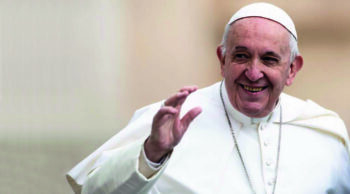Dust in the universe
 We begin the Lenten Season by receiving ashes. The dust sprinkled on our heads brings us back to earth. It reminds us that we are dust and to dust we shall return (Genesis 3:19). We are weak, frail and mortal. Centuries and millennia pass and we come and go. Before the immensity of galaxies and space, we are nothing -- dust in the universe.
We begin the Lenten Season by receiving ashes. The dust sprinkled on our heads brings us back to earth. It reminds us that we are dust and to dust we shall return (Genesis 3:19). We are weak, frail and mortal. Centuries and millennia pass and we come and go. Before the immensity of galaxies and space, we are nothing -- dust in the universe.
Yet we are dust loved by God. It pleased the Lord to gather that dust in his hands and to breathe into it the breath of life (Genesis 2:7). We are thus a dust that is precious, destined for eternal life. We are the dust of the earth, upon which God has poured out his heaven, the dust that contains his dreams. We are God’s hope, his treasure and his glory.
From dust to life
Ashes are thus a reminder of the direction of our existence: a journey from dust to life. We are dust, earth, clay, but if we allow ourselves to be shaped by the hands of God, we become something wondrous.
More often than not, though, especially at times of difficulty and loneliness, we see only our dust! But the Lord encourages us. In his eyes, our littleness is of infinite value. So let us take heart. We were born to be loved, born to be children of God.
Dear brothers and sisters, may we keep this in mind as we begin this Lenten season. For Lent is not a time for useless sermons, but for recognising that our lowly ashes are loved by God. It is a time of grace, a time for letting God gaze upon us with love so that he may change our lives.
From life to dust
The ashes we receive also remind us of another journey: from life to dust. All around us, we see the dust of death. Lives reduced to ashes. Rubble, destruction, war. The lives of unwelcomed innocents, the lives of the excluded poor, the lives of the abandoned elderly. We continue to destroy ourselves, to return to ashes and dust.
And how much dust there is in our relationships! Look at our homes and families -- our quarrels, our inability to resolve conflicts, our unwillingness to apologise, to forgive, to start over, while at the same time insisting on our own freedom and our rights. All this dust that besmirches our love and mars our life.
“Be reconciled to God.”
Let us look inside, into our hearts. How many times do we extinguish the fire of God with the ashes of hypocrisy. Hypocrisy is the filth that Jesus tells us in today’s Gospel that we have to remove. Indeed, the Lord tells us not only to carry out works of charity, to pray and to fast, but also to do these without pretence, duplicity and hypocrisy (Matthew 6:2, 5, 16).
Yet how many times do we make ourselves look good on the outside while nursing grudges within? How much duplicity do we have in our hearts? All this is dust that besmirches, ashes that extinguish the fire of love.
We need to be cleansed of all the dust that has sullied our hearts. How? The urgent summons of Saint Paul in today’s second reading can help us. Paul says, “Be reconciled to God.” He does not simply ask. He begs. “We beg you on behalf of Christ, be reconciled to God” (2 Corinthians 5:20). We would have said, “Reconcile yourselves with God.” But no, Paul uses the passive form, “Be reconciled.” Holiness is not achieved by our efforts. By ourselves, we cannot remove the dust that sullies our hearts. Only Jesus can do that.
 What are we to do?
What are we to do?
In our passage to Easter, we can make two journeys: first, from dust to life, from our fragile humanity to the humanity of Jesus, who heals us. We can halt in contemplation before the crucified Lord and repeat: “Jesus, you love me, transform me.”
And once we have received his love, once we have wept at the thought of that love, we can make the second journey, by determining never to fall again from life into dust. We can receive God’s forgiveness in the sacrament of Reconciliation, because there the fire of God’s love consumes the ashes of our sin. The embrace of the Father in confession renews us from inside and purifies our heart.
God raises us from our ashes
Let us allow ourselves to be loved, so that we can give love in return. Let us allow ourselves to stand up and walk towards Easter. Then we will experience the joy of discovering how God raises us up from our ashes.
From the Pope’s homily, Ash Wednesday 2020
Source: Libreria Editrice Vaticana
 Entries(RSS)
Entries(RSS)